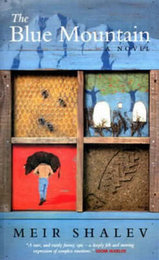
|
The Blue Mountain
Paperback
Main Details
| Title |
The Blue Mountain
|
| Authors and Contributors |
By (author) Meir Shalev
|
|
Translated by Hillel Halkin
|
| Physical Properties |
| Format:Paperback | | Pages:377 | | Dimensions(mm): Height 212,Width 132 |
|
| Category/Genre | Modern and contemporary fiction (post c 1945) |
|---|
| ISBN/Barcode |
9781841951157
|
| Classifications | Dewey:892.436 |
|---|
| Audience | |
|---|
|
Publishing Details |
| Publisher |
Canongate Books Ltd
|
| Imprint |
Canongate Books Ltd
|
| Publication Date |
1 June 2001 |
| Publication Country |
United Kingdom
|
Description
Set in a small rural village prior to the creation of the state of Israel, this imaginative book paints an extraordinary picture of a small community of Ukrainian immigrants as they succeed in pioneering a new life in a new land over three generations. The Blue Mountain transcends its time and place by touching on issues of universal relevance, while never failing to entertain and engage the reader. "Shalev's colorful, feisty characters and vibrant prose animate this indelible depiction of the birth of a nation." -- Publishers Weekly "A vast, and vastly funny, epic; a deeply felt and moving expression of complex emotions." -- Oscar Hijuelos, Pulitzer Prize-winning author of The Mambo Kings Play Songs of Love
ReviewsKirkus Review US:Reminiscent of a painting by Chagall, this portrait of a pioneer village in Israel is strong on atmosphere, color, myth, and symbols but weak on narrative drive. Baruch, a grandson of the pioneers, is the memorialist of a village built in a mountain valley after the settlers had cleared the original mosquito-infested swamps. In his 30s and the rich owner of a cemetery - resting place to the pioneers as well as to Americans wishing to be buried in Israel - Baruch has recently become the owner of a fine seaside villa, a move that prompts recollections of his own. He recalls how his grandfather and two friends left Russia in the early 1900's and came to establish a socialist community. When the trio met the beautiful and brave Feyga Levin, they founded the famous Feyga Levin Workingman's Circle, Whose constitution became a village legend. Though Baruch's grandfather married Feyga, the village never forgave him for his obsession with a woman he'd left behind in Russia. The village is peopled with characters like Pinnes, an inveterate rationalist and teacher; Rilov, the watchman and terrorist who spends his days in the sewer; Uncle Efrayim, who disappears carrying his beloved Charolais bull on his shoulders; and Baruch's grandfather, who becomes as legendary a horticulturist as his beloved Luther Burbank. The animals are equally remarkable: Zeitser the mule, "who had unshakeable principles and a Platform that bent reality like clover stem"; pelicans that brought mail from Russia; and Bulgov the house-cat, turned into a killer by corrupt human society. Evocative, even lyrical, with the underlying magic realism adding to the mythic stature of the villagers and their accomplishments, but there it ends. A portrait, with footnotes, interesting and well-written - nothing more. (Kirkus Reviews)
Kirkus Review US:This is a beautifully written and extraordinary novel from the very first page. It's the story of a small group of Eastern European immigrants cast up onto the wharf in Palestine by Arab stevedores and left to begin to create a new nation - the state of Israel. As they enter Jerusalem they are overawed by the filth and shabbiness of the city and immediately scour the valley for farmland they can purchase. In those days, Mirkin tells his grandson Baruch, the village consisted of only two rows of white tents in a treeless landscape. Years later, lofty avenues of cypresses line the entrance to every farmhouse. Between the first picture and the second lies the history of the village and its people. The story weaves exuberantly back and forth in time between Mirkin's life and grandson Baruch's childhood. Very quickly, the reader becomes like Baruch, 'bound tightly by the heavy raffia' of the yarns. The author plays with time. 'Time passed. Milk flowed. Corn ripened on the stalk, its lancelike leaves cutting the skin. Granaries filled. Fig trees set their fruit. More wars were fought.' We meet Margulis the bee-keeper, schoolteacher Pinness who speaks in poetry and Efrayim who comes back from the war hideously wounded, has to wear a mask to cover his face and carries a young Charolais bull around on his shoulders. The pages are full of entertaining homespun wisdom and Yiddish whimsy. They recreate a lost world of rural truths, simplicity and quirkiness. When one of grandfather Mirkin's trees dies it is pronounced 'fatally infected with the moth of Doubt'. Yet there are also hardships and tragedies. Every house has its dead, whether from bullets or malaria. When his strength fails, Mirkin is relegated to an old people's home where he and his friends cause havoc, draining the goldfish pond and diverting its water for irrigation. When he dies, Baruch buries him on his own land and turns the farm into a cemetery where he becomes rich 'tending a herd of 100 corpses'. Gradually Baruch buries all the old pioneers, reflecting on a lost way of life and esoteric understandings. The village becomes a museum, attracting tourists. Shalev brilliantly illustrates the ferocious struggles of the early Israelis, their mythical humour and their unflinching belief in their destiny. It reaffirms his reputation as a major writer, following acclaim for his previous book, Four Meals. (Kirkus UK)
|